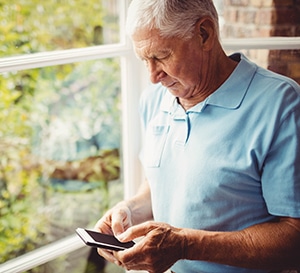 As the pressure on cancer care providers to identify ways to deliver high quality care at a lower cost, there is a big opportunity to use technology to give patients the personalized care they need. Navigating Cancer has led the way in developing tools that will put the patient at the center of their care and ensure that the patient can receive the care the need, even when they are not at the clinic. One of the tools we’ve developed is Health Tracker which sends simple text message reminders and scheduled symptom check-ins to patients, enabling their care team to remotely monitor adherence and side effects and get ahead of issues before they become serious.
As the pressure on cancer care providers to identify ways to deliver high quality care at a lower cost, there is a big opportunity to use technology to give patients the personalized care they need. Navigating Cancer has led the way in developing tools that will put the patient at the center of their care and ensure that the patient can receive the care the need, even when they are not at the clinic. One of the tools we’ve developed is Health Tracker which sends simple text message reminders and scheduled symptom check-ins to patients, enabling their care team to remotely monitor adherence and side effects and get ahead of issues before they become serious.
A recently published study led by Dr. Ethan Basch at Memorial Sloan Kettering Cancer Center in New York offers strong confirmation that systems like Health Tracker make a big difference in patient experience and outcomes. The study randomly assigned patients to “self-report 12 common symptoms via tablet computers.” Physicians were kept informed about these reports and nurses were emailed when patients reported severe symptoms so they could intervene right away. The Washington Post interviewed Dr. Basch to learn more about the significance of the results of the study. It quotes him as saying he “was floored by the results,” stressing the difference it makes to identify problems early that patients may not even realize are serious or avoidable.
We have heard similar things from our clinic partners and that’s why we are so excited about the application of our Health Tracker solution. Barry Russo of the Center for Cancer and Blood Disorders in Fort Worth described his clinic’s practice transformation experience in Oncology Times. Regarding the use of Health Tracker for their patients he said, “It’s hard to overstate the difference this app has made for our patients. For years, patients would land in the ER because a side effect or symptom had become too severe—severe vomiting or diarrhea left untreated for too long. As a result, their treatment might be delayed, discontinued or switched, compromising their outcome. When we would ask patients why they hadn’t notified us immediately, they’d say, ‘I thought I would feel better soon’ or ‘I didn’t know I needed to call.’” With Health Tracker, the patient doesn’t have to decide if they should contact their care team, they are prompted to answer a few questions and their responses are automatically stratified for the care team according to risk.
We will be watching Dr. Basch’s work as he and his team roll their remote monitoring program out nationwide. Preliminary data from our Health Tracker users is also showing positive outcomes, which is very exciting. We have always believed giving patients a direct connection to their care team in a convenient and simple way would impact care, reduce hospitalizations and increase patient satisfaction and now there is data to support that.
If you would like to learn more about Health Tracker, view a brief introductory video or contact us today.
